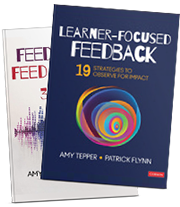It took twenty years of dialogue and professional learning to begin to break down the walls in educational leadership practice that distinguished a principal’s role as an instructional leader versus a manger of budget and buses. The new question in educational leadership is; “What is the distinction between the role of a principal as a supervisor and his/her role as an evaluator?”
In many ways, we are rehashing the same conversation once again.
If I ask 100 leaders to describe what they do as supervisors, the majority will talk about coaching strategies and the ways in which they build relationships with teachers in an effort to ensure their on-going professional growth.
“I inspire and talk about our vision for the school and for instruction.”
“I coach best practice and support staff in their work.”
“I help staff make connections with stakeholders and the community.”
When you ask the same leaders to describe what they do as evaluators, they will typically answers in terms of events.
“I have a goal setting conference.”
“I complete three informal/formal observations.”
“I do a ‘review of practice’.”
If I ask those same leaders to identify what happens during those events, most will identify the form they complete first. With a few probing questions we may eventually get to how the dialogue is helping the teacher to reflect on his/her practice.
This is the fundamental issue clouding evaluation practice. Policy decisions made about evaluation practice have seemingly ignored educational and literature-based understandings of leadership supervisory practice. As a result, evaluation in schools has become a series or string of events versus a system upon which we lead our staff to new levels of practice.
Why the separation? Historically…
- supervision is more a long-term process versus evaluation described as more of a monitoring process of isolated practice.
- supervision requires knowledge, skills, attitudes and values that contribute to the effectiveness of the organization and it’s ability to teach and prepare students
- supervision is done to coordinate efforts that contribute to student achievement while evaluation is done to monitor teacher practice.
Those evaluators we have worked with for the past five years who have not allowed these definitions to define their evaluation practice have been the ones who have been most successful at moving teacher practice. Leaders who choose to define their role as an evaluator in terms of how they are “teacher of teachers,” do not separate their role of supervision from their role of evaluator. They have moved beyond the silos of traditional definitions and, instead, ensure that they…
- unwrap teacher performance standards with their teachers and ensure the highest levels of clarity about the expectations of practice. Then they use those standards as the basis for a learning plan that over time supports teachers in continuous cycles of improvement.
- do not rely on single events or even single forms of evidence and data about teacher practice to make assessments in support of teacher performance. They engage, instead, in authentic assessment of practice over the course of the school year and provide timely feedback that targets teacher learning.
- don’t let the model get in the way. The do not let ineffective and ill-designed policies drive their practice. They don’t just do it right, they do the right thing. These evaluators take on their responsibilities with a transformative-orientation versus a compliance orientation and consider events as a means to ensuring dialogue towards improved practice.
The simple message here is that evaluators need to learn strategies that safely blur the lines of supervision and evaluation. I know everyone is talking about student outcomes being used to evaluate teacher performance and politicians are beginning to placate potential voters during this election year by reducing the percent of impact of standardized assessment or, as was done here in CT, eliminating whole tests from state programming. What I am talking about in my state is the one thing related to evaluation that does make a difference, quality feedback to teachers about their practice and how it impacts student outcomes. Feedback is that one thing related to evaluation that has quality foundational research tied to it and can, when done well, truly impact classroom practice towards student achievement.




We are a family run dive centre in Cyprus, we love your content.